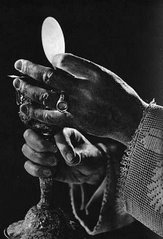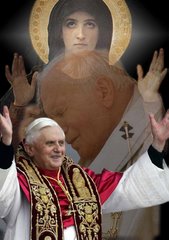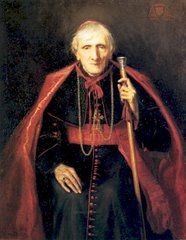This Sunday, founding Parousian Tobias Danna will be presenting on "Moral Imagination, Sacramental Vision, Beauty, and Marriage." Toby will be drawing on the works of Pope John Paul II, Pope Benedict XVI, Viguen Guorian, and Louise Cowan's "Marriage is a Creative Act," which has been posted onto the blog. The meeting will begin at 8 o'clock this Sunday at Ryan Hallford's residence at 4463 Tupello St. Directions can be obtained by calling (504) 952-0247.
A preview from Toby's talk:
“Fred Hutchinson in a column from Renew America (Alan Keyes’ grassroots group) defines moral imagination as that faculty which ties together wisdom and moral virtue. I find that definition lacking in depth of explanation. I insist imagination doubly has a creative element to it, both in the image being implanted in the mind, and in the mind’s capacity to create a vision by which he or she should live. Vigen Guorian is the eminent modern proponent of its renewal, the heir to G. K. Chesterton, T. S. Eliot, Flannery O’Connor and Russell Kirk. Guorian himself frequently deals with the subject in relation to the images children receive in fairy tales (remember Chesterton’s ethics of elfland.)
Guorian defines the moral imagination using a Chesterton quote, writing: “Musing on the wisdom and ethics of the fairy tale, G. K. Chesterton observes that the genre sparks a special way of seeing that is indispensable to morality. Chesterton writes: ‘I am concerned with a certain way of looking at life, which was created in me by the fairy tales, but has since been meekly ratified by mere facts.’ I am calling this way of looking at life the moral imagination. For Chesterton is suggesting what the moral imagination is when he remarks: ‘We can say why we take liberty from a man who takes liberties. But we cannot say why an egg can turn into a chicken any more than we can say why a bear could turn into a fairy prince. As ideas, the egg and the chicken are further from each other than the bear and the prince; for no egg itself suggests a chicken, whereas some princes do suggest bears.’"
Guorian and others campaign for a revival of moral imagination in creative works (as in literature) by men and women of letters. The effects of a move away from the diabolical, idyllic, and idolatrous imaginations to the moral imagination is a revitalization of the humane society. In our thought, this would be a uniquely Catholic vision of life seen sacramentally.
Guorian quotes Eliot: “The author of a work of imagination is trying to affect us wholly, as human beings, whether he knows it or not, and we are affected by it, as human beings, whether we intend to be or not. I suppose that everything we eat has some effect upon us other than merely the pleasure of taste and mastication; it affects us during the process of assimilation and digestion; and I believe that exactly the same is true of anything we read.”
Here is my cross application. Marriage is a creative work. It has procreation as its primary end, yet the marriage should produce more fruit than mere biological fruitfulness. It is a means of sanctification for the parties involved, which means the creation of the fruit of the Holy Spirit in the life of the family. Furthermore, marriage is a sign (by no stretch of the imagination, a drama) being seen by the world, reflecting the love between Christ and his Church. Just as Christ and his Church in unitive love and united effort redeem the world, sparking a revitalization of the truly human according to the divine intention, married life in a localized way carries this same redemptive quality, primarily in the family life but also as a witness to those who view the family.
The view of our lives as living letters of faith is Saint Paul’s. The view of our lives as narratives pointing to the divine is reflected from Saint Augustine’s Confessions to Saint Therese’s Story of the Soul (many thanks to Caleb for the Augustine/Buffet talk reminding me of this.) If our lives can be viewed by the saints as creative works (surely authored by God in collaboration with our own free wills), there is certainly this quality in sacramental marriage.
Kirk says, “Nothing is, but thinking makes it so.” I contend we go into marriage with a vision that will dictate the success or failure of the marriage. I contend that a moral (or some other) imagination of marriage is imprinted on us with greater and lesser degrees of quality, hopefully by our parents and the Church, and we know what good and bad attitudes toward marriage are. We should look for those attributes of God in the state of marriage and in a theoretical spouse, that they will reflect what is just and beautiful and true (and of course, ideally our concepts of these things should not be askew.)
The moral imagination of particular persons as potential spouse, and ultimately, one particular person as spouse, depends on imagining the particulars of both parties and how they in union might contribute to this great mystery of God’s love being revealed both to each other and the world so that the kingdom of God might advance. It is animated by a hope that is not blindly placed in marriage being good or the beloved being wonderful, but oriented towards the particularities of the individuals. And in understanding the principles of sacrificial death and resurrection, the individual must be captivated so greatly by the particular possibilities of new life that exists in marriage to the beloved, and in the process die to both the freedom to choose another and to the selfish desires and vain imaginations of the individual. There should be a mutual awareness of mutual co-redemption, and the shared aspiration towards a particular way of living according to the beatific vision with one another.
This is where we meet the subjective element, why the willingness to choose a particular field to die in above others (both known and unknown.) There is a mystical element to it, after all any communication between persons with souls is mystical, but I think the mark of most modern marriages is a denial of a true and reasonable mysticism in favor of a pseudo-mystical interpretation of biochemical impulses and poorly formed notions of goodness, beauty, and truth. Yet graces work in these marriages too, even the failed ones, only in a lesser quantity with a great number of obstacles placed in the way of missing the fewer graces offered. It is reminiscent of the grace at work in the midst of rape, murder, and grotesque violence in a Flannery O’Connor story, certainly true grace pointing to God obtained in undesirable ways. The graces at work in an O’Connor story were never nearly as graceful as the devout Catholic Flannery O’Connor.
I don’t think it a coincidence that the Pope of the New Evangelization is the Pope of the Theology of the Body, a poet and playwright whose life was the unfolding of a superior moral imagination.”
Subscribe to:
Post Comments (Atom)






No comments:
Post a Comment